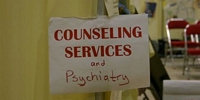When you're "plugged in" to the actions of someone else, you typically have a strong emotional reaction. You know that you are right and the other person is wrong. When emotions run high, intelligence tends to run low. When that happens it's hard to make good decisions or relate and communicate well with others.
You know you're stuck in this pitfall when you are reactive and start to see everything in absolutes -- things become black or white. The blame game starts. Climbing up on the soap box, you pull out the laundry list of all the grievances you have against your ex-partner. You share it with anyone who will listen. Those negative, repetitive thoughts get louder. Ironically, the person you publicly proclaim you're "over with" ends up consuming your thoughts, time, energy, and peace of mind.
In the breakup of an intimate relationship, you move through many layers of "disentangling." It takes time to disengage the emotional connection and reframe the relationship you have with your ex. As author Debbie Ford says, if the relationship with your ex-spouse feels difficult, it indicates there's still work to do. "We must heal our inner wounds. If we don't do it, we keep fueling the conflict and the hurt."
Being negatively affected by your ex-spouse gets in the way of being present and available to your children. It can also be a barrier in creating new intimate relationships. Being hooked by your ex-spouse affects your tone, your body language, your listening, your attitude and your energy level. Here are some key strategies to unplugging from your ex.
1. What Your Ex Thinks of You is NONE of Your Business
To help pull out the emotional hooks you have embedded in your psyche, please repeat after me: "What my ex thinks of me is none of my business." You can choose to not take the actions of your ex-spouse personally. When you make what other people think or feel about you more important than what you think or feel about you, you give your power away. If your ex-partner didn't "get" you or respect you when you were married, how is that suddenly going to turn around now that you're no longer together? Focus on how you feel about yourself and what you need to do as a way to reclaim your power. You gain so much freedom in letting go of the fantasy that your ex should behave, act, or think in a certain way. Suffering comes when your fantasy is different than the reality you're living. The ironic thing is that after you let your fantasy go and you start taking responsibility for what you do have control over, that's probably when your ex will start to behave differently.
2. Take Responsibility for Your Reality
Ultimately you are only responsible for your own feelings, emotions, behaviors, actions, and thoughts. Those are the only pieces of your life over which you have any iota of control. If you're feeling stuck in old patterns with your ex, ask yourself, "How will I live a great life even if my ex never supports, agrees with or acknowledges me?" Ask yourself what you need, and then give it to yourself. If your ex is treating you disrespectfully, what can you do to respect yourself more? Our relationships with our former partners often offer the biggest clues to us as to how we can move forward and take responsibility for creating our results.
3. Reframe Your Relationship with Your Ex
If you have children together, your relationship with your ex will need to change from an emotional and romantic relationship to more of a business partnership. You are the cofounders and CEOs of the business of raising healthy and emotionally well-adjusted children. Create structure to your communications with schedules, agendas and respect. It's not always easy to be great coparents, yet that is a gift well worth giving your children. If you don't have children together, reframe your relationship into an important learning opportunity and stepping stone to creating a more loving, successful relationship in future.
4. Create a Supportive Environment
Is there a feeding frenzy with friends or family wanting to engage in gossip or ex bashing with you? Initially, this may feel good to you and satisfy any feelings of revenge that you may have. In the long run, it does you (and your children) no good. You actually perpetuate and strengthen your relationship with your ex-spouse, but in a very detrimental way that makes you a victim. Create a supportive social environment for yourself. Like a snake that needs to shed a layer of skin as it grows, you may need to shed some old friends or habits that don't support your growth or healing. Let people know the pity party is over and implement a "no gossip" policy.
5. Don't Rely Solely on a Legal Solution
Some people make the mistake of relying on the court system and lawyers to hammer out a working relationship between the divorcing couple. Typically the courts view you as a "case," not as a "family." Although lawyers are an important part of your support team, you need to be the quarterback who's prepared to call the plays. Your lawyer can only act upon your direction. Explore alternatives to duking it out in courts, like collaborative law or mediation.



